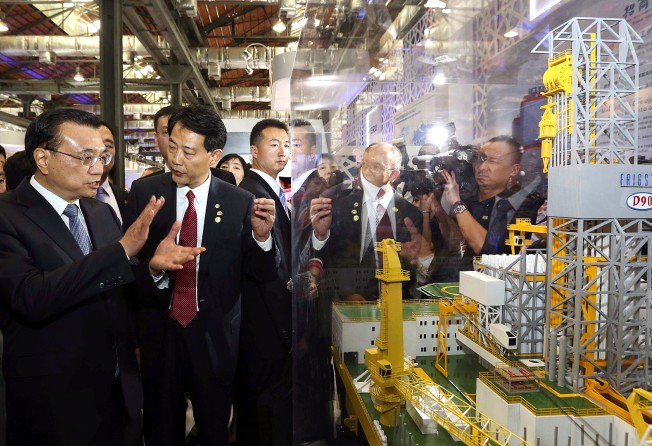US$70 billion plan to export China’s spare industrial capacity
Two-pronged scheme sees US$30 billion fund for industrial joint ventures overseas backed by US$40 billion sovereign wealth fund initiative

Beijing will set aside US$70 billion in capital for international ventures by Chinese enterprises as the country steps up infrastructure investment abroad amid an economic downturn and production over capacity.
Premier Li Keqiang announced yesterday during his visit to Brazil there would be a US$30 billion fund for promoting international cooperation in ventures that export China’s industrial capacity. In addition, China’s sovereign wealth fund, China Investment Corporation, would set up an overseas investment vehicle with a capitalisation possibly greater than the US$40 billion Silk Road Fund to support the strategy.
Li said the US$30 billion fund would be open to cooperation projects with no political strings attached. He said Chinese enterprises were willing to participate in railway construction, high-voltage electrical power transmission, internet technology and next-generation mobile telecommunications technology, Xinhua reported.
Watch: China and Brazil unveil multibillion trade and investment deals
In a separate development, Gu Dawei, director of foreign capital utilisation at the National Development and Reform 8CommissionÖ, said yesterday that a proposal to establish a CIC subsidiary focused on direct investment in overseas equity had been approved. “The company has 8already been set up and started initial operations, adopting a 8series of measures to support enterprises [in overseas ventures],” Gu was quoted as saying.
The State Council had on Saturday released a guideline on boosting international cooperation on exporting China’s industrial capacity and equipment manufacturing. This highlighted that “international cooperation is critical for China to sustain medium-to-high GDP expansion as sales of industrial capacity will foster new growth areas”.
“We don’t simply sell products overseas, but export our industry as a whole to foreign countries, and at the same time help these countries to establish a more complete industrial system and manufacturing capacity,” Gu said.
Gu said Chinese companies were being encouraged to adopt new business models, such as working together to set up industrial parks abroad.
Chinese enterprises’ international ventures would also be supported by funds including the Silk Road Fund, Gu said.
Li Lifan, an international affairs expert at the Shanghai Academy of Social Science, said that in exporting industries, Chinese enterprises would bring mature technologies to developing countries. “There are currently abundant active capital flows in the world, and developing countries have many choices on which investments to receive. In addition to money, the sharing of technology is an important advantage,” Li said.
The State Council earmarked the following industries: steel, non-ferrous metals, construction materials, railways, electric power, chemicals, textiles, automobiles, telecommunications, machinery, aviation and aerospace, and ship building and maritime engineering.
On Tuesday, the State Council unveiled its “Made in China 2025” plan to upgrade and internationalise manufacturing in 10 years. It also vowed to encourage Chinese enterprises to invest overseas and set up manufacturing industry parks in foreign countries.
